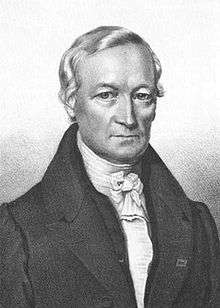Friedrich Tiedemann
| Friedrich Tiedemann | |
|---|---|
 Tiedemann in 1820 | |
| Born |
23 August 1781 Cassel, Hesse-Kassel (now Kassel, Hesse, Germany) |
| Died |
22 January 1861 (aged 79) Munich |
| Nationality | German |
| Fields | Anatomy |
| Doctoral advisor | Johann Wilhelm Christian Brühl[1] |
| Other academic advisors |
Conrad Moench Georg Wilhelm Stein Adalbert Friedrich Marcus Karl Kaspar von Siebold Franz Kaspar Hesselbach Georges Cuvier |
| Influences |
Friedrich Wilhelm Joseph Schelling Samuel Thomas von Sömmerring |
|
Signature | |
Friedrich Tiedemann (23 August 1781 – 22 January 1861) was a German anatomist and physiologist.
Tiedemann spent most of his life as professor of anatomy and physiology at Heidelberg, a position to which he was appointed in 1816, after having filled the chair of anatomy and zoology for ten years at Landshut, and died at Munich.[2] He was elected member of the Royal Swedish Academy of Sciences in 1827. In 1836, he was elected Honorary Fellow of the Royal College of Surgeons in Ireland.[3]
Early life and education
Tiedemann was born at Cassel, the eldest son of Dietrich Tiedemann (1748–1803), a philosopher and psychologist of considerable repute. He graduated in medicine at Marburg in 1804, but soon abandoned practice.[2]
Career
Tiedemann devoted himself to the study of natural science, and, upon moving to Paris, France, became an ardent follower of Georges Cuvier. On his return to Germany he maintained the claims of patient and sober anatomical research against the prevalent speculations of the school of Lorenz Oken, whose foremost antagonist he was long reckoned. His remarkable studies of the development of the human brain, as correlated with his father's studies on the development of intelligence, deserve mention.[2]
Tiedemann was one of the first persons to make a scientific contestation of racism. In his article entitled "On the Brain of the Negro, compared with that of the European and the Orang-outang" (1836), he argued based on craniometric and brain measures taken by him from Europeans and black men from different parts of the world that the then-common European belief that Negroes have smaller brains and are thus intellectually inferior is scientifically unfounded and based merely on the prejudice of travelers and explorers.[4]
In 1827 he became correspondent of the Royal Institute of the Netherlands, when that became the Royal Netherlands Academy of Arts and Sciences in 1851 he joined as foreign member.[5] He was elected a Foreign Honorary Member of the American Academy of Arts and Sciences in 1849.[6]
Tiedemann was influenced by Jean-Baptiste Lamarck and accepted the transmutation of species.[7] Science historian Robert J. Richards has written that Tiedemann "joined the basic notion of species evolution, of a Lamarckian flavor, with the proposition that higher animals in their embryological development recapitulated the morphological stages of those lower in the scale."[8]
Personal life
Two of Tiedemann's sons, Gustav and Heinrich, were casualties of the 1848 uprisings.[9]
Legacy
In 2007, Brazilian geneticist Sergio Pena called Tiedemann an "anti-racist ahead of his time".[10]
References
- ↑ Neurotree profile Friedrich Tiedemann
- 1 2 3 Chisholm 1911.
- ↑ http://www.igp-web.com/IGPArchives/ire/countrywide/xmisc/rcsi-hon-fellows.txt
- ↑ Tiedemann, Friedrich (1836). "On the Brain of the Negro, compared with that of the european and the orang-outang" (PDF). Phil. Trans. 126.. Tiedemann was heavily criticized in medical journals at the time, including by Andrew Comb, Remarks on the Fallacy of Professor Tiedemann, Eclectic Journal of Medicine (1838).
- ↑ "Friedrich Tiedemann (1781 - 1861)". Royal Netherlands Academy of Arts and Sciences. Retrieved 20 July 2015.
- ↑ "Book of Members, 1780–2010: Chapter F" (PDF). American Academy of Arts and Sciences. Retrieved 9 September 2016.
- ↑ Ruse, Michael; Travis, Joseph. (2009). Evolution: The First Four Billion Years. Belknap Press. p. 442. ISBN 978-0674062214
- ↑ Richards, Robert J. (2008). The Tragic Sense of Life: Ernst Haeckel and the Struggle over Evolutionary Thought. University Of Chicago Press. p. 466. ISBN 978-0226712161
- ↑ Koenig, Robert. (2009). The Fourth Horseman: The Tragedy of Anton Dilger and the Birth of Biological Terrorism. Tantor Media. p. 21. ISBN 978-1400153503
- ↑ Pena, Sergio (2007). "Um anti-racista à frente de seu tempo". Ciencia Hoje. Instituto Ciencia Hoje. Retrieved April 6, 2013.
Um anti-racista à frente de seu tempo
- Attribution
![]() This article incorporates text from a publication now in the public domain: Chisholm, Hugh, ed. (1911). "Tiedemann, Friedrich". Encyclopædia Britannica (11th ed.). Cambridge University Press.
This article incorporates text from a publication now in the public domain: Chisholm, Hugh, ed. (1911). "Tiedemann, Friedrich". Encyclopædia Britannica (11th ed.). Cambridge University Press.
External links
- Neurotree: Friedrich Tiedemann Details
- The Great Physiologist of Heidelberg - Friedrich Tiedemann by Stephen Jay Gould